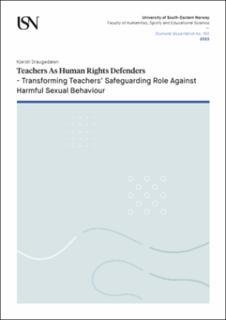Teachers As Human Rights Defenders : Transforming Teachers’ Safeguarding Role Against Harmful Sexual Behaviour
Doctoral thesis
Published version
Permanent lenke
https://hdl.handle.net/11250/3065204Utgivelsesdato
2023Metadata
Vis full innførselSamlinger
Sammendrag
This study explores teachers’ understandings of and responses to harmful sexual
behaviour (HSB) in primary schools, and the challenges that schools face in building
interdisciplinary cooperation with other children’s service providers. The aim of the
study is to strengthen teachers' transformative safeguarding for children who display
HSB through enhanced interdisciplinary cooperation between schools and frontline
service providers. The five research questions guiding the study are:
RQ1: How do teachers understand and respond to HSB?
RQ2: What support systems do teachers identify in safeguarding against HSB?
RQ 3: How do teachers identify support and engage with school-based
colleagues/other professionals/service providers?
RQ 4: What do teachers need to implement transformative safeguarding in schools?
RQ 5: How can frontline services support teachers’ transformative safeguarding in
schools?
The empirical study was carried out in one municipality in south-eastern Norway using
an exploratory mixed methods approach, and with a sequential multiphase study design
divided into four phases. In phase one, a baseline survey was conducted with 159
primary school teachers. Phase two consisted of focus-group interviews with 19
teachers and school staff. Drawing on the findings from the survey and focus-group
interviews, phase three involved building grounded theory that might support
sustainable safeguarding among educators and other professionals. Phase four
consisted of qualitative interviews with members of six frontline services cooperating
with schools.
The study found that most teachers in the sample struggle to differentiate between
healthy, problematic and harmful sexual behaviour, and are uncertain about how to
respond to it or who to contact (Article I). Safeguarding is perceived as an overwhelming responsibility and many teachers fail to intervene when they encounter harmful sexual
behaviour due to lack of competence, time, resources and support available to them.
Furthermore, asymmetrical power relations between teachers and those they might
seek support from add to their anxieties about HSB and safeguarding (Article II). Aligning
Nel Noddings’ ‘Ethics of Care’ with Human Rights Education (HRE) in a child-rights-based
approach, the study develops a grounded theory to address the asymmetrical power
relations and the role of emotions teachers experience when they encounter HSB. This
opens for new transformative practices for addressing HSB in schools (Article III).
Building on this theory and on insights from service providers, the study proposes the
following measures to support teachers’ safeguarding activities: physical presence of
other agencies in schools; cooperative practices when addressing concerns; and shared
HSB training and resource allocation. The study advocates a ‘system of care’ of
transformative practices for interdisciplinary cooperation between school and frontline
services, encompassing the role of emotions and asymmetrical power relations (Article
IV).
Består av
Article I: Draugedalen, K. (2021). Teachers’ responses to harmful sexual behaviour in primary school – findings from a digital survey among primary school teachers, Journal of Sexual Aggression, 27(2), https://doi.org/10.1080/13552600.2020.1773552Article II: Draugedalen, K., Kleive, H. & Grov, Ø. (2021). Preventing harmful sexual behavior in primary schools: barriers and solutions. Child Abuse & Neglect, 121 https://doi.org/10.1016/j.chiabu.2021.105295
Article III: Draugedalen, K. & Osler, A. (2022). Teachers as human rights defenders: strengthening HRE and safeguarding theory to prevent child sexual abuse. Human Rights Education Review, 5(2). https://doi.org/10.7577/hrer.4776
Article IV: Draugedalen, K. (2023). Supporting Teachers in Safeguarding against Harmful Sexual Behaviour - Service Providers’ Perspectives on Transformative Practices. London Review of Education. 21 (1), 4. https://doi.org/10.14324/LRE.21.1.04

